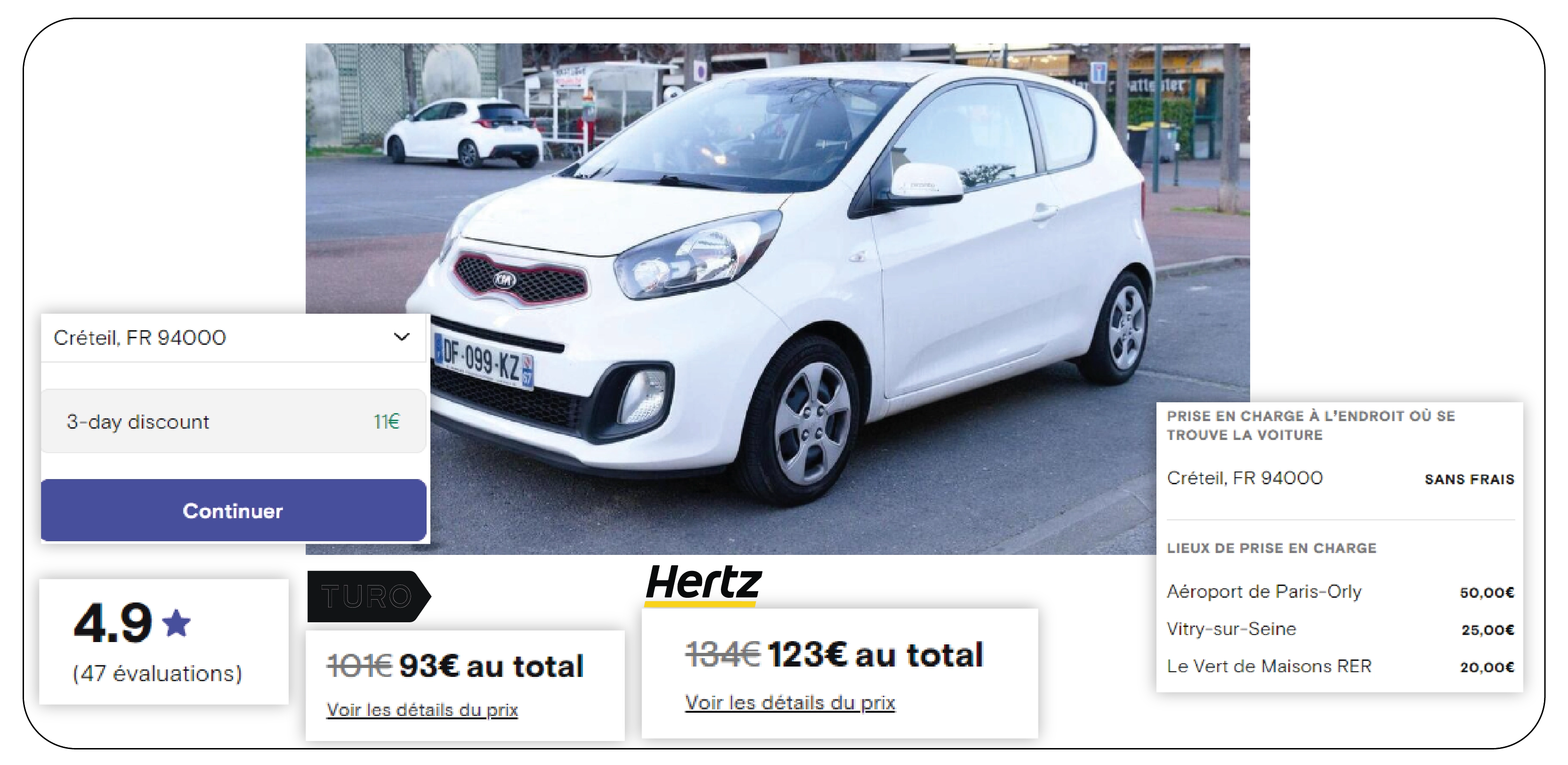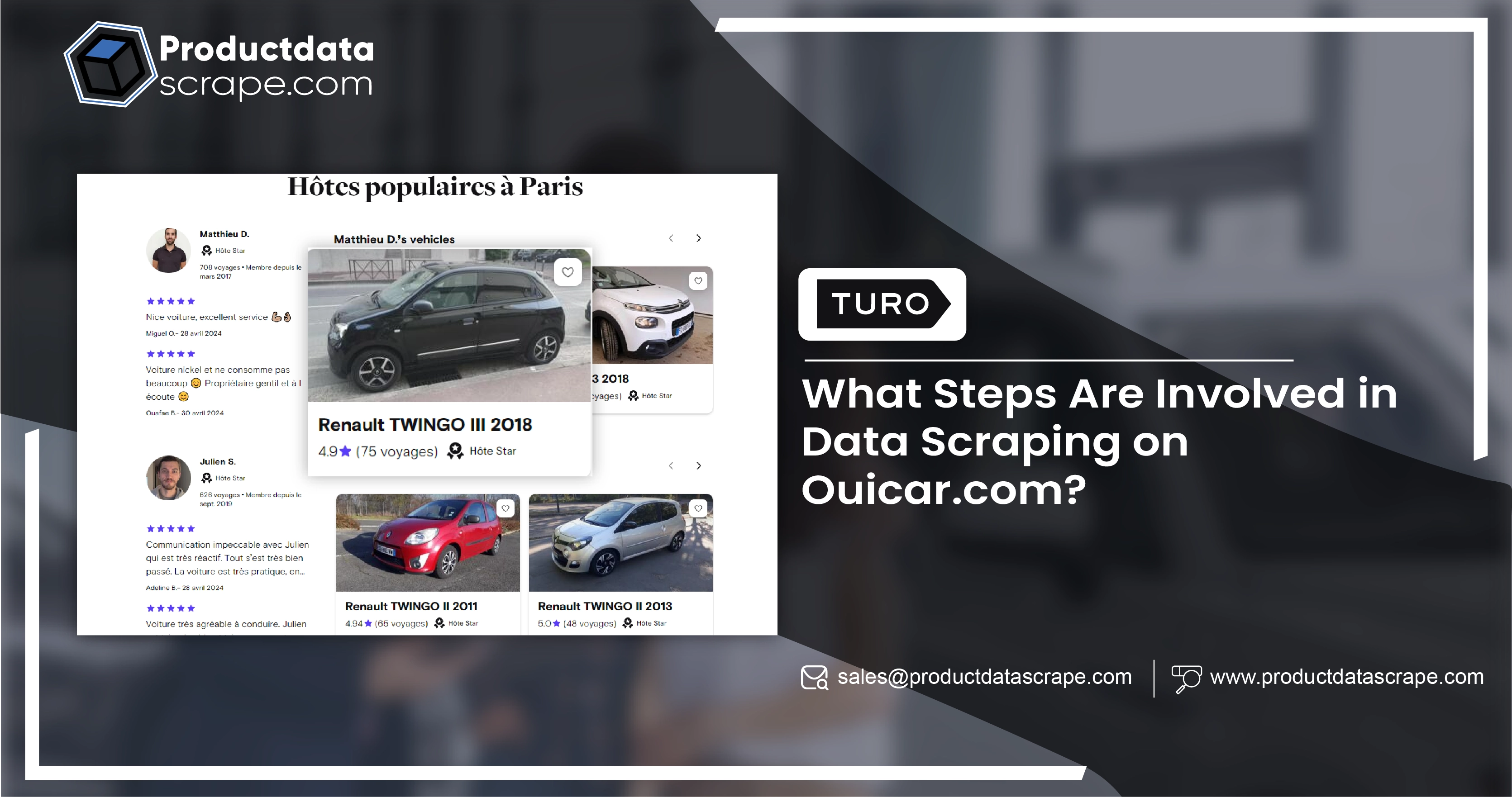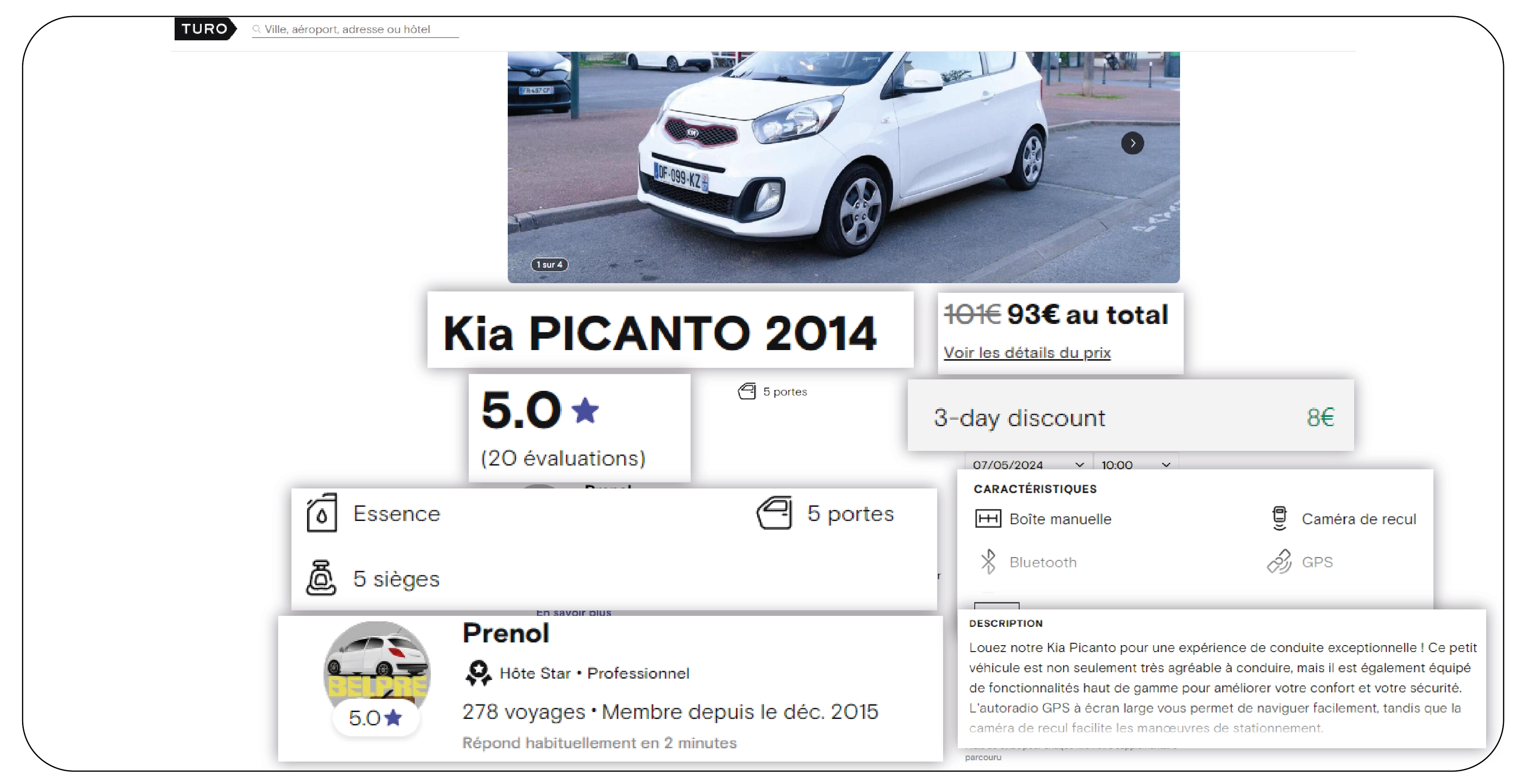Significance of Scraping Car Rental Data from Ouicar.com

Scraping car rental data from OuiCar.com can offer significant advantages and insights for various stakeholders, including consumers, businesses, researchers, and policymakers. Here are some key points highlighting the significance of extracting car rental data from Ouicar.com:
Market Analysis: By scraping data from Ouicar.com, analysts can gain valuable insights into the dynamics of the car rental market. It includes information on rental rates, availability of different vehicle types, popular rental locations, seasonal fluctuations, and competitor analysis. Such insights can inform strategic decisions for established car rental companies and new entrants into the market.
Price Comparison: Scraping rental data allows consumers to easily compare prices across different rental companies and vehicle categories. It empowers consumers to make informed decisions based on budget, rental duration, and vehicle specifications. Access to accurate and up-to-date pricing information can result in significant cost savings for renters.
Demand Forecasting: Car rental companies can leverage ECommerce Product Data Scraping Services to forecast demand patterns and optimize fleet management strategies. By analyzing historical rental data from Ouicar.com, companies can identify trends and anticipate periods of high demand, enabling them to adjust pricing, availability, and staffing accordingly. This proactive approach can minimize idle inventory and maximize revenue potential.
Customer Insights: Scrutinizing user reviews, ratings, and feedback from Ouicar.com helps provide valuable insights into customer preferences, satisfaction levels, and pain points. This qualitative data can guide companies in improving service quality, enhancing customer experience, and developing targeted marketing campaigns to attract and retain customers.
Competitive Intelligence: Car rental data scraping services facilitate competitive benchmarking and analysis. By monitoring competitors' pricing strategies, promotional offers, and customer reviews, companies can better understand their position in the market and identify opportunities for differentiation and improvement. This intelligence enables companies to stay agile and responsive to changing market dynamics.
Regulatory Compliance: Researchers and policymakers can utilize scraped data to monitor compliance with regulations governing the car rental industry, such as pricing transparency, consumer protection laws, and environmental regulations. By analyzing rental data from Ouicar.com, policymakers can assess the effectiveness of existing regulations and identify areas for potential reform or enforcement.
Innovation and Product Development: Access to comprehensive car rental data can stimulate innovation and drive product development within the industry. Through data analysis, companies can identify emerging trends, customer preferences, and unmet needs, leading to the introduction of new services, vehicle models, and technology solutions that cater to evolving consumer demands.
Risk Management: Scrutinizing rental data allows companies to identify and mitigate potential risks, such as fraud, vehicle damage, and insurance claims. By analyzing historical patterns and anomalies in rental transactions, companies can implement preventive measures, enhance security protocols, and optimize insurance coverage to minimize financial losses and reputational damage.
Thus, Web Scraping Retail Websites Data offers many benefits, ranging from market analysis and price comparison to demand forecasting and risk management. Whether you're a consumer seeking the best deal on a rental car or a business looking to gain a competitive edge, timely and accurate rental data can be invaluable in making informed decisions and driving innovation within the car rental industry.
Steps to Scrape Ouicar.com Data

Scraping data from Ouicar.com to collect information such as car details, rental specifics, and owner ratings involves several steps. Below are the general steps you can follow to scrape the required data:
the Website Structure: Understand the structure of Ouicar.com, including the layout of pages containing car listings, rental details, and owner information. Inspect the HTML structure of these pages to locate the relevant elements and attributes containing the data you want to scrape.
Choose a Web Scraping Tool: Select a suitable car rental data scraper or library for your programming language, such as BeautifulSoup (Python), Scrapy, or Selenium. These tools provide functionalities to parse HTML content, extract data, and navigate through web pages.
Set Up Your Environment: Install the chosen web scraping tool and any necessary dependencies. Create a programming environment where you can write and execute your scraping scripts.
Write the Scraping Script:
- Start by sending an HTTP request to the Ouicar.com website to retrieve the HTML content of the page.
- Use the web scraping tool to parse the HTML content and extract relevant information based on the identified elements and attributes. It may involve finding specific HTML tags, classes, or IDs that contain the desired data.
- Write code to iterate through the car listings on the website, extracting details such as car model, year, power, mileage, number of doors, type, category, transmission, number of seats, rental price, and owner information.
- Implement logic to filter the listings based on the specified city, rental duration (planned number of days after today for the next four months), and other relevant criteria.
- Extract the stars of the car, the rating of the car, the stars of the owner, and the rating of the owner as per your requirements.
- Store the scraped data in a structured format such as CSV, JSON, or a database for further analysis and processing.
Handle Pagination: If the website uses pagination to display multiple pages of car listings, incorporate logic in your scraping script to navigate the pages and scrape data from each page iteratively.
Handle Dynamic Content (if applicable): If Ouicar.com uses dynamic content loaded via JavaScript or AJAX, consider using a tool like Selenium that can interact with the website as a real user would. It enables you to scrape data from dynamically generated elements.
Test and Debug: Thoroughly test your scraping script to ensure it retrieves the desired data accurately and gracefully handles edge cases. Debug any issues that arise during the scraping process.
Respect Robots.txt and Terms of Service: Before scraping any website, review its robots.txt file and terms of service to ensure compliance with its scraping policies. Implement rate-limiting and respectful scraping practices to avoid overloading the website's servers.
Monitor and Update: Regularly monitor the scraping process for any website structure or layout changes that may affect your script. Update your script accordingly to maintain its effectiveness.
Data Analysis and Visualization: Once you have collected the scraped data, perform data analysis and visualization to derive insights and trends from the extracted information. It may involve statistical analysis, visualization with charts or graphs, and other techniques to make sense of the data.
Here's a simplified version of the scraping process:
import requests
from bs4 import BeautifulSoup
import csv
from datetime import datetime, timedelta
def scrape_Ouicar(city):
base_url = f"https://www.Ouicar.com/{city}"
headers = {"User-Agent": "Mozilla/5.0 (Windows NT 10.0; Win64; x64) AppleWebKit/537.36 (KHTML, like Gecko) Chrome/91.0.4472.124 Safari/537.36"}
# Create CSV file for storing scraped data
with open(f"Ouicar_{city}_data.csv", "w", newline="", encoding="utf-8") as csvfile:
fieldnames = ["Car Model", "Year", "Power", "Mileage", "Number of Doors", "Type", "Category",
"Transmission", "Number of Seats", "Price", "Stars of the Car", "Rating of the Car",
"Owner Name", "Owner Stars", "Owner Rating"]
writer = csv.DictWriter(csvfile, fieldnames=fieldnames)
writer.writeheader()
# Set up a loop for iterating over pages (if pagination is present)
page = 1
while True:
url = f"{base_url}/page/{page}"
response = requests.get(url, headers=headers)
soup = BeautifulSoup(response.content, "html.parser")
# Check if there are no more pages
if "No cars found" in soup.get_text():
break
# Extract car listings
listings = soup.find_all("div", class_="car-listing")
for listing in listings:
car_model = listing.find("h2", class_="car-title").text.strip()
year = listing.find("span", class_="car-year").text.strip()
power = listing.find("span", class_="car-power").text.strip()
mileage = listing.find("span", class_="car-mileage").text.strip()
doors = listing.find("span", class_="car-doors").text.strip()
car_type = listing.find("span", class_="car-type").text.strip()
category = listing.find("span", class_="car-category").text.strip()
transmission = listing.find("span", class_="car-transmission").text.strip()
seats = listing.find("span", class_="car-seats").text.strip()
price = listing.find("div", class_="car-price").text.strip()
stars_car = listing.find("div", class_="car-stars").text.strip()
rating_car = listing.find("div", class_="car-rating").text.strip()
# Get owner information
owner_info = listing.find("div", class_="owner-info")
owner_name = owner_info.find("div", class_="owner-name").text.strip()
owner_stars = owner_info.find("div", class_="owner-stars").text.strip()
owner_rating = owner_info.find("div", class_="owner-rating").text.strip()
# Write data to CSV
writer.writerow({
"Car Model": car_model,
"Year": year,
"Power": power,
"Mileage": mileage,
"Number of Doors": doors,
"Type": car_type,
"Category": category,
"Transmission": transmission,
"Number of Seats": seats,
"Price": price,
"Stars of the Car": stars_car,
"Rating of the Car": rating_car,
"Owner Name": owner_name,
"Owner Stars": owner_stars,
"Owner Rating": owner_rating
})
# Increment page number
page += 1
# Specify the city you want to scrape
city = "example-city"
# Scrape data for the specified city
scrape_Ouicar(city)
This script scrapes car rental data from Ouicar.com for a specified city. It would help to replace "example-city" with the name of the city you want to scrape. The script extracts details about each car listing, including the car model, year, power, mileage, price, owner information, and more. It then writes the extracted data to a CSV file named Ouicar_example-city_data.csv.
Following these steps, you can scrape car rental data from Ouicar.com and collect the required information for analysis and decision-making.
Conclusion: Scraping car rental data from Ouicar.com offers many benefits for stakeholders, including consumers, businesses, researchers, and policymakers. This process enables comprehensive and up-to-date information on car rental availability, pricing, customer reviews, and owner ratings. By harnessing scraped data, stakeholders can make informed decisions, optimize business strategies, and drive innovation within the car rental industry. Moreover, it facilitates market analysis, competitive intelligence, and regulatory compliance efforts. Scraping car rental data from Ouicar.com empowers stakeholders with valuable insights, leading to improved customer experiences, enhanced operational efficiency, and better-informed decision-making processes.
At Product Data Scrape, ethical principles are central to our operations. Whether it's Competitor Price Monitoring or Mobile App Data Scraping, transparency and integrity define our approach. With offices spanning multiple locations, we offer customized solutions, striving to surpass client expectations and foster success in data analytics.



































.webp)






